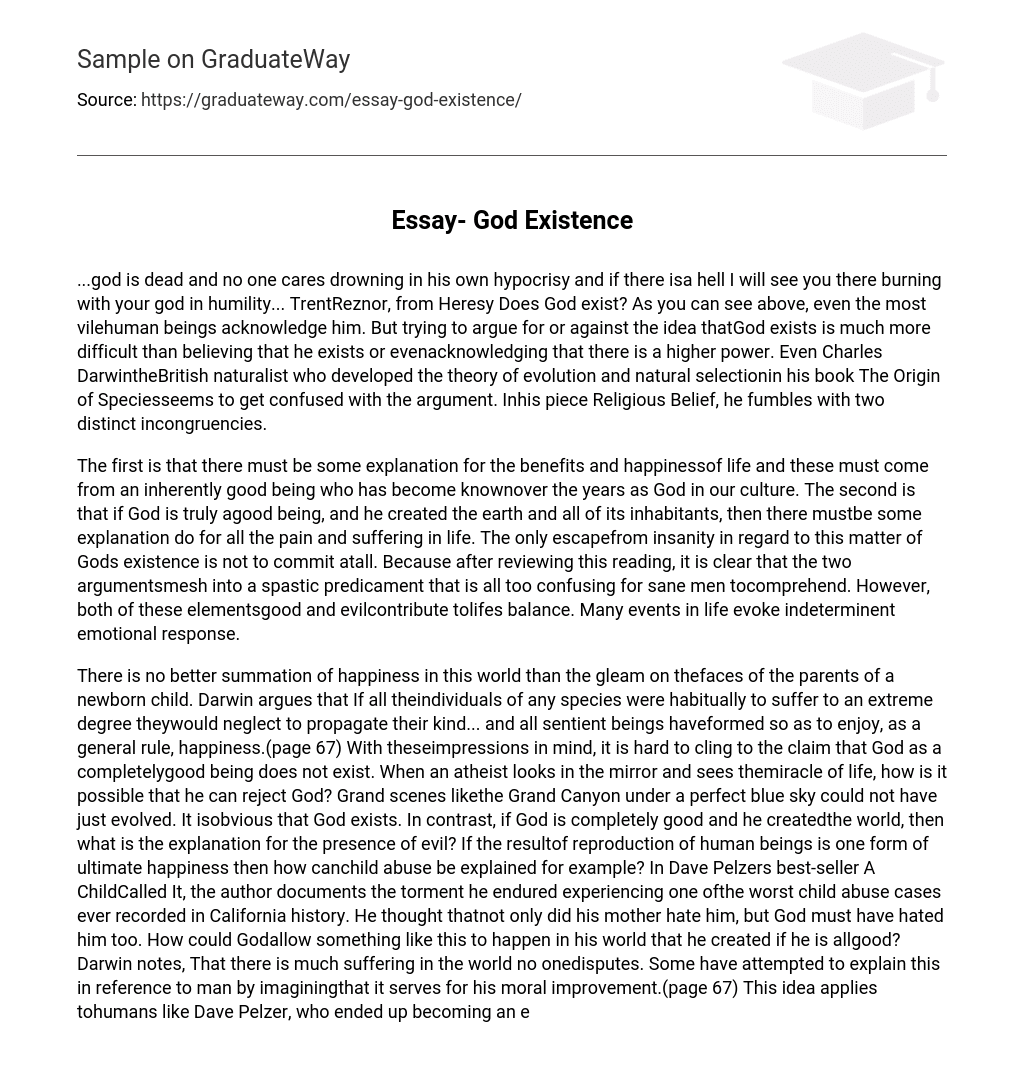As you can see above, even the most vilehuman beings acknowledge him. But trying to argue for or against the idea thatGod exists is much more difficult than believing that he exists or evenacknowledging that there is a higher power. Even Charles DarwintheBritish naturalist who developed the theory of evolution and natural selectionin his book The Origin of Speciesseems to get confused with the argument. Inhis piece Religious Belief, he fumbles with two distinct incongruencies.
The first is that there must be some explanation for the benefits and happinessof life and these must come from an inherently good being who has become knownover the years as God in our culture. The second is that if God is truly agood being, and he created the earth and all of its inhabitants, then there mustbe some explanation do for all the pain and suffering in life.
The only escapefrom insanity in regard to this matter of Gods existence is not to commit atall. Because after reviewing this reading, it is clear that the two argumentsmesh into a spastic predicament that is all too confusing for sane men tocomprehend. However, both of these elementsgood and evilcontribute tolifes balance. Many events in life evoke indeterminent emotional response.
There is no better summation of happiness in this world than the gleam on thefaces of the parents of a newborn child. Darwin argues that If all theindividuals of any species were habitually to suffer to an extreme degree theywould neglect to propagate their kind… and all sentient beings haveformed so as to enjoy, as a general rule, happiness.(page 67)
With theseimpressions in mind, it is hard to cling to the claim that God as a completelygood being does not exist. When an atheist looks in the mirror and sees themiracle of life, how is it possible that he can reject God? Grand scenes likethe Grand Canyon under a perfect blue sky could not have just evolved.
It isobvious that God exists. In contrast, if God is completely good and he createdthe world, then what is the explanation for the presence of evil? If the resultof reproduction of human beings is one form of ultimate happiness then how canchild abuse be explained for example? In Dave Pelzers best-seller A ChildCalled It, the author documents the torment he endured experiencing one ofthe worst child abuse cases ever recorded in California history. He thought thatnot only did his mother hate him, but God must have hated him too.
How could Godallow something like this to happen in his world that he created if he is allgood? Darwin notes, That there is much suffering in the world no onedisputes. Some have attempted to explain this in reference to man by imaginingthat it serves for his moral improvement.(page 67)
This idea applies tohumans like Dave Pelzer, who ended up becoming an extremely productive member ofthe United States Air Force and a successful author. However, Darwin also bringsup the idea that there are thousands of other species that suffer greatly inlife and do not improve their morals. Would God allow evil to flourish to theextent that we see it just for moral improvement? Perhaps he does not exist. Atthis point there is strong evidence in arguments for and against the existenceof God. This is one of the few arguments that appears to be never-ending.
It isan infinite loop. Darwin says that he connected his belief in God with thehigher feelings of wonder, admiration, and devotion which fill and elate themind,(page 67) but concludes this idea by saying that these grand feelingscan be brought about by other things, like music for instance, and can hardly bea part of the argument for the existence of God. This is an example of the webthat one gets caught in when trying to participate in this argument.
Darwinsviews are very logical and acceptable, but because he is participating in thisargument, he is confusing. Darwins essay brings in two sides of the storyconcerning the existence of God. He first asks, How can the generallybeneficent arrangement of the world be accounted for?(page 67) and suggeststhat happiness prevails because there is a purely good God. He counters thisargument with the suggestion that there are millions of suffering creatures thatachieve no moral improvement due to their suffering and there is no explanationfor this evil.
The idea that the only reason suffering exists for human beingsis for their moral improvement is less believable because of this. These pointsbring about an argument that has no finale. So Darwin is right in hisconclusion, I cannot pretend to throw the least light on such abstruseproblems. The mystery of the beginning of all things is insoluble by us; and Ifor one must be content to remain an Agnostic.





